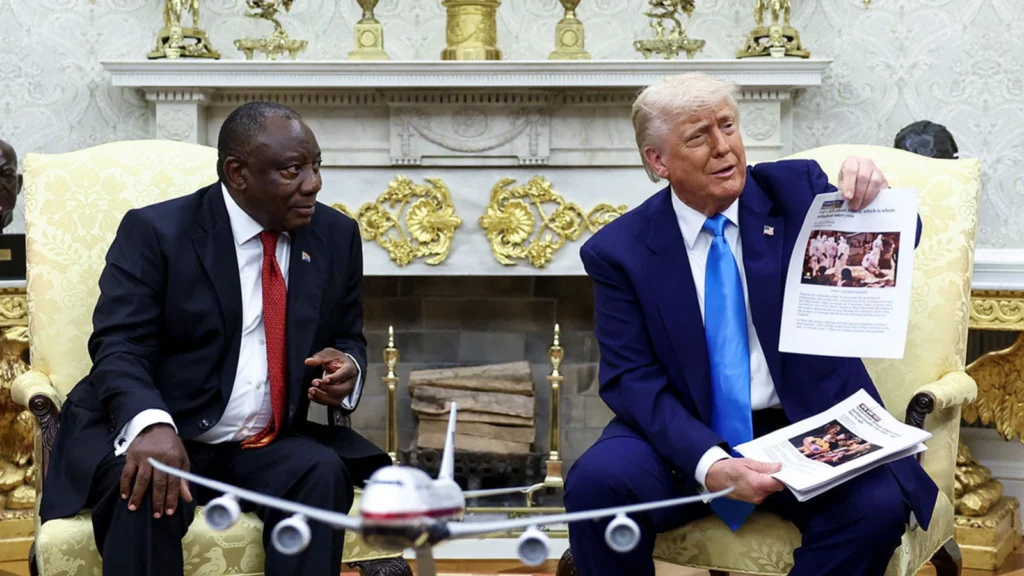South Africans Divided on Cyril Ramaphosa’s Confrontation with Donald Trump
In a recent Oval Office meeting, former President Donald Trump challenged South Africa’s President Cyril Ramaphosa, stirring significant controversy and division among South Africans. The encounter has underscored various perspectives on the political climate within the nation, especially regarding issues of race, crime, and governance.
Support from Afrikaner Groups
Trump’s confrontational remarks and unorthodox approach were enthusiastically received by right-wing Afrikaner factions, who have long pushed for international attention on what they assert is systemic persecution of white farmers in South Africa. The Solidarity Movement, which has actively lobbied the U.S. administration, welcomed Trump’s focus, asserting it only highlights the “enormous problems” faced by South Africa.
Ernst Roets, a prominent figure in the Afrikaner community, praised Trump for his actions, offering a statement on social media that read, “Donald Trump made history today.” His sentiments echoed throughout smaller political factions, with some even suggesting Trump deserved a Nobel Prize for elevating the issue of violent crimes against white farmers to the global stage.
Ramaphosa’s Calm Response
Despite being subjected to Trump’s barrage of claims, Ramaphosa maintained his composure during the meeting. He successfully integrated his delegation into the discourse, emphasizing that while political issues need addressing, South Africa is a democracy where individuals like Julius Malema and his party, the Economic Freedom Fighters (EFF), have a constitutional right to exist. Ramaphosa’s calm demeanor was acknowledged by critics and supporters, highlighting a leadership style focused on dialogue rather than confrontation.
Diverse Perspectives on Crime and Race
While right-wing groups rallied around Trump’s statements, many South Africans expressed discontent towards their actions. Critics argued that these factions exhibit disloyalty by seeking external intervention for South Africa’s internal issues. There is a largely shared sentiment among South Africans regarding the need for unity in addressing national challenges such as crime—an issue that crosses racial and class lines and affects all communities in the country.
John Steenhuisen, the leader of the Democratic Alliance, representing the nation’s second-largest political party, emphasized that there are “real safety problems” in South Africa, but insists that most farmers, regardless of race, wish to stay and contribute to the nation.
Understanding the Complexity of the Situation
The visit also highlighted the complexities surrounding ongoing debates about land reform and economic equality in South Africa. Trump’s spotlight on Malema’s polarizing song, “Shoot the Boer,” stoked fears among many Afrikaners, though judges have ruled that such protest songs are not calls to violence but rather a form of political expression.
Navigating the Future
As discussions continue, different factions of South African society remain divided over their reaction to Trump’s confrontation with their president. Ramaphosa has advocated for unity, likening his leadership to that of Nelson Mandela, who remains a symbol of reconciliation post-apartheid.
Key Comparisons of Responses
| Group | Response |
|---|---|
| Right-Wing Afrikaners | Support Trump’s claims; view it as validation of their struggles. |
| Democratic Alliance | Acknowledges crime issues but opposes framing issues within a racial narrative. |
| Critics of Right-Wing Groups | Accuse groups of seeking external intervention against national unity. |
Ultimately, the dialogue emerging from this encounter will continue to shape the landscape of South African politics. As various factions vie for the future direction of the country, it remains imperative to focus on collaboration and constructive solutions to the challenges that all South Africans face.


